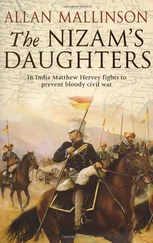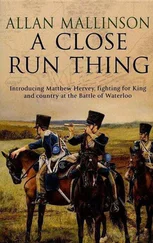Allan Mallinson - The Sabre_s Edge
Здесь есть возможность читать онлайн «Allan Mallinson - The Sabre_s Edge» весь текст электронной книги совершенно бесплатно (целиком полную версию без сокращений). В некоторых случаях можно слушать аудио, скачать через торрент в формате fb2 и присутствует краткое содержание. Жанр: Исторические приключения, на английском языке. Описание произведения, (предисловие) а так же отзывы посетителей доступны на портале библиотеки ЛибКат.
- Название:The Sabre_s Edge
- Автор:
- Жанр:
- Год:неизвестен
- ISBN:нет данных
- Рейтинг книги:4 / 5. Голосов: 1
-
Избранное:Добавить в избранное
- Отзывы:
-
Ваша оценка:
- 80
- 1
- 2
- 3
- 4
- 5
The Sabre_s Edge: краткое содержание, описание и аннотация
Предлагаем к чтению аннотацию, описание, краткое содержание или предисловие (зависит от того, что написал сам автор книги «The Sabre_s Edge»). Если вы не нашли необходимую информацию о книге — напишите в комментариях, мы постараемся отыскать её.
The Sabre_s Edge — читать онлайн бесплатно полную книгу (весь текст) целиком
Ниже представлен текст книги, разбитый по страницам. Система сохранения места последней прочитанной страницы, позволяет с удобством читать онлайн бесплатно книгу «The Sabre_s Edge», без необходимости каждый раз заново искать на чём Вы остановились. Поставьте закладку, и сможете в любой момент перейти на страницу, на которой закончили чтение.
Интервал:
Закладка:
By the time the downpour had eased, a full hour later, Hervey had concluded that of the seven private men, five of whom were from Dublin and thereabouts, four might take to being dragoons with very little effort – supposing, of course, they showed a modicum of aptitude for the saddle -and that of the other three, two were inveterate 'machine men', happy only when their every action was preceded by a word of command from the corporal, while the other was quite probably unsuited even to his present position, so sullen was he that Hervey imagined the Serjeant's pike a regular prompter. However, much as he admired the Eighty-ninth's drill that morning, and the relish with which they had gone to the expected fight, he would admit to missing E Troop with its cheery, sometimes outspoken, dragoons. Whatever General Campbell might say now about the utility of cavalry, Hervey was certain he would feel the want of them before the month was out.
As the rain had become little more than a drizzle, he stood up and went to the door of their shelter. He could now see the river again. Pulling upstream were a dozen boats filled with marines and men from the Calcutta brigade, not yet 'blooded' in this curious inaction. He had helped write their orders the night before: they were off to do what he and his dragoons could have done in a fraction of the time and with far less effort. If only those who had conceived this adventure had allowed the possibility of action over land rather than solely from water! He had heard it said in Calcutta that horses could not pass over such terrain. How could anyone doubt that, where a man could go in this country, there for the most part could a horse? Nor, indeed, that when the monsoon turned the country to nothing but swamp there would be no passage for beast or man.
Hervey thought of hailing the boats. It would be diverting to join them, for there was nothing to do here but watch the Eighty-ninth put the place in a state of defence. But he reluctantly concluded that it was time he reported himself back to Campbell's military secretary. He was sure there would be nothing for him to do – nothing, at least, of the slightest consequence – but if he exhausted Major Seagrass's indulgence too soon it would be so much the harder to get leave for when the infantry made a determined foray. He slapped his neck with left and right hand in rapid succession, but too late to prevent the bites, and he cursed. It was worse than the fleas in the lousiest billets in Spain.
CHAPTER THREE
Four days later Hervey slipped into the room where Major-General Sir Archibald Campbell was about to hold his council. It was not very large – enough for a couple of dozen people – and the lamps and candles were making the otherwise coolest time of the day hot. Hervey wondered what could be the imperative for calling the conference three hours before dawn. He supposed he would have heard of any alarm, so the general must have intelligence new come by; or else he had resolved on something that he had been privately turning over for days.
The two brigadiers rose as the general entered, and with them the dozen or so officers on the headquarters staff. Sir Archibald Campbell nodded – all sat – and then he nodded once more, to his quartermaster-general, who pulled loose the knot that held furled a sheet on the wall. Down rolled a hand-drawn sketch of the stockaded port and the Rangoon river to the extent of some two leagues to the north. At the furthest point of the river, on the eastern bank, there was a red circle.
'Gentlemen,' began the general briskly, seizing the bayonet on the table beside the wall and tapping the map with it. 'In the five and one-half days since we hove to in the river yonder' (he inclined his head to indicate the direction), 'our circumstances have changed so decidedly that I am obliged to conceive a wholly new plan of campaign.'
Hervey, as every man in the room, was all attention. He was hardly surprised to hear the assessment, only that it had been the best part of a week in the making. And he was as much relieved as he was surprised to hear it stated so candidly. There had never been any doubting Major-General Sir Archibald Campbell as a fighting officer. Word was that he had been given the exacting command of a Portuguese brigade in the Peninsula because of his impressive physique and offensive spirit, and because the duke himself knew at first hand of his youthful exploits in Mysore. But fearless and spirited fighting was one thing; the design of a campaign – the decision how to fight – was quite another. And the design of a campaign was not something to which General Campbell had had any apprenticeship.
'Or perhaps, gentlemen, I should say that it is necessary to recognize that our circumstances are not as were earlier imagined. It is evident that the Burman people are either too afeard to rally to us, or have no heart to do so. We are therefore in want of supplies from Calcutta, and any expedition to Ava will be through hostile territory. Indeed, it will need to be supplied through hostile territory.'
Every man in Rangoon must be of the same opinion, thought Hervey. Indeed, Peto had told him yesterday that the sloops he had sent to reconnoitre the mouths of the Irawadi had reported the channels running close in to numerous forts. But at least now they might proceed openly on the presumption of Burman hostility. They might even be allowed to butcher the few cattle that remained. Immunity from the slaughterman's axe had been one thing five days ago, but there was scant reason now to let the troops starve so that sacred cattle could live.
'It is also evident,' continued General Campbell, his voice slowing a little as if to emphasize the importance of what was to follow, 'that the enemy have built themselves stockaded forts upriver, and that thence they are in a position to assail us at will, by land and, what is more, by river, and not least is the renewed threat of fire boats.'
Hervey wondered which might be the general's inference, for there were two that he and Peto had drawn. Would he require to hold Rangoon as a base for operations against the interior, or did he intend to abandon the port since its capture was evidently not the calamity the Governor-General had anticipated? Although, in fairness, there had scarcely been time for the news to shake Ava. The general brandished the bayonet again. 'And so, gentlemen, our first object is to destroy the Burman capacity for the offensive.'
The declaration of the objective and the jabbing of the bayonet had an immediate effect. There was such a hubbub that the sentry posted outside peered round the door.
The general raised his other hand, and there was silence again. Today, therefore, we make a beginning. Colonel McCreagh, you will seize the stockaded village of Kemmendine, here.' He stabbed at the red circle on the map. 'And I wish the assault to be given to my own regiment, the Thirty-eighth.'
Colonel McCreagh simply nodded. There was no need of questions: it would be boat work and the bayonet.
'Colonel Macbean, I wish the Madras brigade to ascertain where to the west of Rangoon the enemy are encamped, and what their intentions are.' The general pointed vaguely at the left of the map, where the forest was represented by pictures of trees of very English appearance.
Hervey hoped that no one imagined it would be like taking a walk in an English park. He had memories enough of the jungle, and he counted that he had been very lucky in his adventures.
'Very well, General,' replied Colonel Macbean. There was no need of questions in this either, for the colonel saw it much like searching for the needle in the bottle of hay. 'And now the matter of supply.'
The general's voice did not falter, but Hervey thought he detected a note less assured. It beggared belief that within hours of the start of England's first war since Waterloo (as Campbell had grandly announced it to his officers in Calcutta), the regiments had been placed on half rations and sentries set to guard the water butts. In the decade since that battle had every hard-learned lesson been forgotten?
Читать дальшеИнтервал:
Закладка:
Похожие книги на «The Sabre_s Edge»
Представляем Вашему вниманию похожие книги на «The Sabre_s Edge» списком для выбора. Мы отобрали схожую по названию и смыслу литературу в надежде предоставить читателям больше вариантов отыскать новые, интересные, ещё непрочитанные произведения.
Обсуждение, отзывы о книге «The Sabre_s Edge» и просто собственные мнения читателей. Оставьте ваши комментарии, напишите, что Вы думаете о произведении, его смысле или главных героях. Укажите что конкретно понравилось, а что нет, и почему Вы так считаете.












